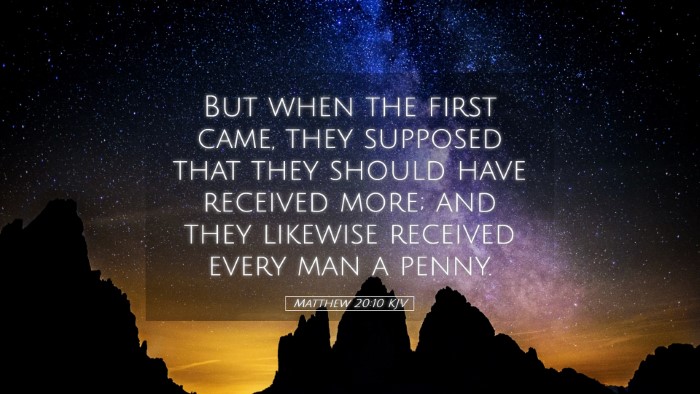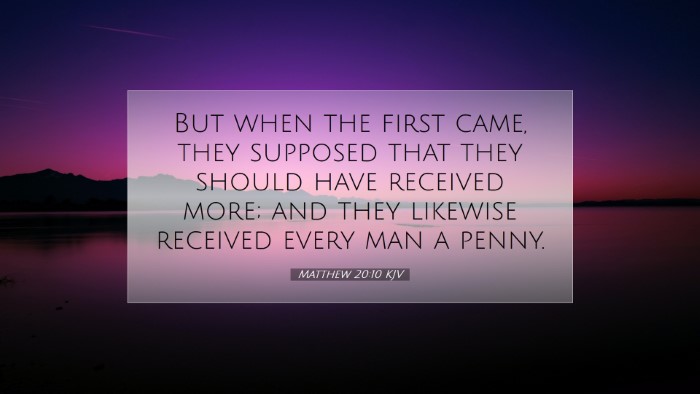Commentary on Matthew 20:10
Verse: "But when the first came, they supposed that they would receive more; and they likewise received every man a penny."
Introduction
Matthew 20:10 is part of the Parable of the Workers in the Vineyard, where Jesus illustrates the nature of God's grace and the surprising equity of His kingdom. This verse captures the moment the first workers, who labored longest, expected greater reward, yet received the same payment as those who worked only for an hour. This passage challenges preconceived notions of meritocracy and divine justice.
Contextual Analysis
The surrounding context of this parable is crucial for understanding its profound implications. At the time, Jesus addressed a Jewish audience steeped in traditional views of labor and reward, reflective of their cultural work ethics and expectations. This parable serves not only to instruct the disciples but also to redirect prevailing thoughts about the kingdom of heaven.
- Social Hierarchies: At the heart of this parable is a critique of societal stratification, where the expectations of honor and reward based on labor duration are challenged.
- Divine Generosity: The master of the vineyard symbolizes God's generous nature, offering grace abundantly, irrespective of human standards.
Commentary Insights
Matthew Henry: Henry underlines the expectation of the laborers, likening their anticipation of a greater reward to humanity’s tendency to compare oneself to others. He emphasizes that those who are first may naturally assume they deserve more but fail to realize that their wages reflect the grace of the employer rather than their merit.
Albert Barnes: Barnes points out that the workers expected more based on their longer labor, which highlights a common human misunderstanding regarding grace. His commentary invites reflection on how God's rewards often defy human calculations and urges believers to rejoice in God’s generosity rather than begrudge others their blessings.
Adam Clarke: Clarke interprets this verse as a reminder that God’s economy operates on principles that differ from earthly reward systems. He asserts that laborers in the vineyard symbolize different groups within the kingdom of heaven, showing that everyone, regardless of their past, can receive the same grace. His insights call for humility in the face of God’s unmerited favor.
Theological Reflections
This parable invites a deeper examination of theological themes:
- Grace vs. Merit: The underlying message challenges the belief that human effort equates to divine reward, amplifying the gospel's radical nature of grace.
- Universal Call: Just as all workers are called to the vineyard, God beckons all to His kingdom, encapsulating the inclusivity of salvation.
- Rejoicing in Others' Good Fortune: Believers are encouraged to celebrate grace in others, transcending envy and fostering a community hallmarked by joy and gratitude.
Practical Applications
For pastors, students, and theologians, Matthew 20:10 offers rich opportunities for practical application:
- Preaching on Grace: Highlight the radical nature of grace in sermons and discussions, stressing the importance of understanding God’s equitability.
- Self-Reflection: Encourage congregants to consider their own responses to God’s grace towards themselves and others, fostering a community of humility and thankfulness.
- Inclusive Ministry: Reflect on the call to minister to all, regardless of their background or duration in faith, reinforcing the notion that all are welcome in God’s vineyard.
Conclusion
Matthew 20:10 serves as a powerful reminder of the divine principles that govern God’s kingdom. It compels believers to reassess their understanding of fairness, justice, and grace. As we embrace the fundamental truth that all are equally blessed, may we cultivate hearts that reflect God’s generosity and a community that celebrates His divine grace without reservation.


